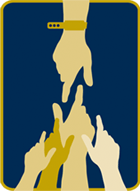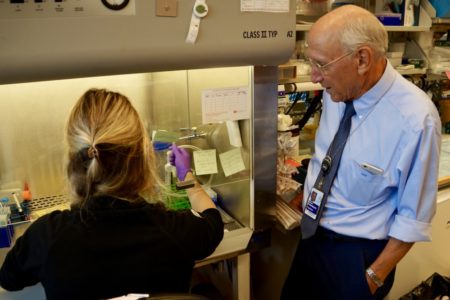The NIH’s Dr. Steven Rosenberg – Pioneering Researcher, Surgeon, Mentor and Mensch
Decades ago, Dr. Steven Rosenberg was the first to show that immunotherapy – harnessing the body’s own immune system to kill cancer cells – could work. Since then, he has been at the center of efforts to advance this fast-emerging field to the point where today, immunotherapy and related techniques are offering hope to more people with a range of cancers.
Dr. Rosenberg has worked for more than 40 years at the National Cancer Institute, where he is Chief of the Surgery Branch. He says that what has kept him here, and fed his passion to pursue research that can lead to tomorrow’s cures, is the way NIH marries basic science and patient care.
“You can walk down our hallway and you’ll find the laboratory that produces the cells that we give to patients, and 20 yards away is our intensive care unit and our ward. We carry the cells over, give them to patients, and study the results,” he says. “It is a unique environment that exists nowhere else.”
This month, Dr. Rosenberg is featured in Discovery’s First in Human, a three-part television documentary series that follows four patients and their doctors as they partner to find life-saving treatments. Dr. Rosenberg knows the topic well. In the lab, he has played a leading role in many of NIH’s first-in- human cancer treatments, while at the same time mentoring hundreds of young cancer researchers who have gone on to make their own significant contributions to the field. What inspired Dr. Rosenberg to study the body’s immune capacity as a cancer treatment in the first place? Early in his career, he says saw a patient whose tumors spontaneously disappeared in the absence of treatment – apparently wiped out by his own immune system. That extraordinary case fueled a lifelong passion and journey to figure out how the body itself, with some help from science, could become an effective anti-cancer agent. In traveling that road, he and his patients have experienced tremendous hope and humbling challenges. Case in point? “Patient #67.”
As Dr. Rosenberg told a select audience in May at the First in Human premiere in Washington DC, in the early 1980s, he had treated 66 advanced cancer patients with immunotherapy, giving them interleukin-2, a protein that boosts the production of T-cells or cells produced in the laboratory using interleukin-2. None of the 66 responded, and all eventually died. And then….
“As we adjusted the doses, in 1984, Linda Taylor, a Navy officer with melanoma, was the first patient whose tumor disappeared just by giving this immune stimulator,” he recalled. Linda immediately held a dead tumor party – and continues to celebrate her cancer-free life today. Based on Dr. Rosenberg’s trials this treatment went on to be the first immunotherapy approved by the FDA for metastatic kidney cancer in 1992 and metastatic melanoma in 1998.
Dr. Rosenberg’s list of first-in- human successes is long, but not without setbacks, including some documented in the Discovery series. Among the most promising approaches being tested today is CAR T-Cell therapy, a technique where cells are extracted from the patient’s blood, genetically engineered to grow a super-charged cancer fighting receptor on its surface, activated and multiplied a million times over, then reinfused into the patient. Dr. Rosenberg’s group was the first to publish the successful treatment of a patient with advanced lymphoma, a 48 year old male who underwent a complete cancer regression, now ongoing over seven years later. This treatment has produced remarkable responses in some patients when all other approaches stop working, but it remains experimental, and not every patient benefits.
Dr. Rosenberg is optimistic about the future of immunotherapy. It is important to keep cancer treatment advances in perspective, he says, noting that half the patients who develop cancer in 2017 will be cured with conventional treatments of surgery, radiation, and chemotherapy. But that still leaves over 500,000 patients who won’t be cured every year. And it’s those people he thinks about as he works in the lab, and at patients’ bedsides, every day. “I see immunotherapy now as this fourth arm of the modalities that we have to treat cancer and, in my view, it is likely to become the one that is most effective for patients with advanced disease.,” he adds.
To support the NIH and advance the research of Dr. Rosenberg and his colleagues, Friends of Patients at the NIH provides emergency financial and emotional support to patients in need to ensure they remain in trials when the stresses of treatment threaten their families’ stability. “People come here often in desperate shape. They will tell you that their worst moments are not when they developed cancer, but when somebody told them there was no hope. They come to us and they have hope,’ he said. “Supporting them and keeping them in the clinical trials — the help that friends gives – is vital in that effort.”





